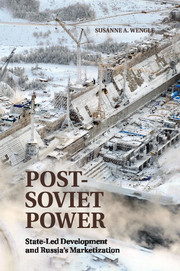
-
Select format
-
- Publisher:
- Cambridge University Press
- Publication date:
- 05 December 2014
- 05 February 2015
- ISBN:
- 9781139680479
- 9781107072480
- 9781107420922
- Dimensions:
- (228 x 152 mm)
- Weight & Pages:
- 0.59kg, 310 Pages
- Dimensions:
- (229 x 152 mm)
- Weight & Pages:
- 0.45kg, 310 Pages
You may already have access via personal or institutional login
Book description
Post-Soviet Power tells the story of the Russian electricity system and examines the politics of its transformation from a ministry to a market. Susanne A. Wengle shifts our focus away from what has been at the center of post-Soviet political economy - corruption and the lack of structural reforms - to draw attention to political struggles to establish a state with the ability to govern the economy. She highlights the importance of hands-on economic planning by authorities - post-Soviet developmentalism - and details the market mechanisms that have been created. This book argues that these observations urge us to think of economies and political authority as mutually constitutive, in Russia and beyond. Whereas political science often thinks of market arrangements resulting from political institutions, Russia's marketization demonstrates that political status is also produced by the market arrangements that actors create. Taking this reflexivity seriously suggests a view of economies and markets as constructed and contingent entities.
Reviews
'The first full-length study of Russia’s electricity industry, the backbone of the Russian economy. Wengle shows how a sustained decade-long program to privatize the industry was forced to compromise with the realities of Russia’s complex geography and the mutual dependence of state officials and business interests. Essential reading for anyone trying to understand why Russia has failed to develop into a competitive market economy.'
Peter Rutland - Wesleyan University
'Susanne Wengle presents fresh and enormously insightful perspectives on many of the most important transformations of the last two decades. Post-Soviet Power should be required reading for those interested in everything from privatization to price liberalization, from the rise of oligarchs in the 1990s to state centralization in the 2000s, and from the Russian electricity sector to the political economy of development worldwide.'
Douglas Rogers - Yale University
'Through a careful study of reforms in the electricity sector, Susanne Wengle offers a powerful, compelling argument about how the evolution of post-Soviet marketization has coexisted with, and is partly dependent on, the reassertion of state authority in the Putin era. Such a theoretically sophisticated analysis of Russia’s political economy is long overdue. I enthusiastically recommend this book to anyone interested in Russian politics, post-communist transitions, development studies, or comparative political economy writ large.'
Rudra Sil - Director, Huntsman Program in International Studies and Business, University of Pennsylvania
'Most social scientists have understood the post-Soviet Russian state as an arena for the interplay of interests, focusing on corruption or struggles among powerful groups. Susanne Wengle’s remarkable study of electricity sector transformation advances a meticulously researched, powerfully argued, and deeply persuasive counterclaim: federal and regional efforts to promote broad social and developmental aims are essential to understanding the political economy of post-socialism. Wengle’s sophisticated approach to enduring conceptual quandaries - such as the interplay of ideas and interests, and the mutually constitutive relationship of politics and the economy - merits the attention of scholars interested in the political economy of reform more broadly, as they greatly enrich our toolkit for studying contemporary forms of state-led development around the world.'
Stephen J. Collier - The New School for Social Research
Contents
Metrics
Altmetric attention score
Full text views
Full text views help Loading metrics...
Loading metrics...
* Views captured on Cambridge Core between #date#. This data will be updated every 24 hours.
Usage data cannot currently be displayed.
Accessibility standard: Unknown
Why this information is here
This section outlines the accessibility features of this content - including support for screen readers, full keyboard navigation and high-contrast display options. This may not be relevant for you.
Accessibility Information
Accessibility compliance for the PDF of this book is currently unknown and may be updated in the future.


